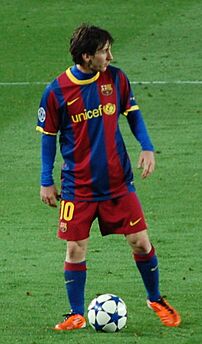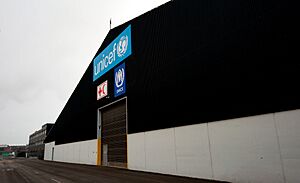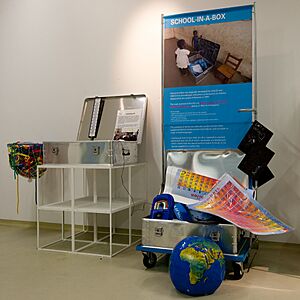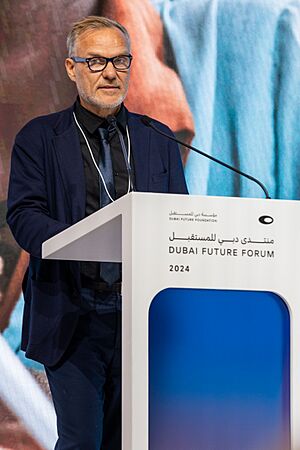UNICEF facts for kids
Quick facts for kids  United Nations Children's Fund |
|
|---|---|
| Org type | Fund |
| Status | Active 11 December 1946 (as United Nations International Children's Emergency Fund) |
| Headquarters | New York City, U.S. |
| Website | www.unicef.org |
UNICEF (/ˈjuːniˌsɛf/ yoo-NEE-sef), which stands for the United Nations Children's Fund, is a special agency of the United Nations. Its main job is to provide help and support to children all over the world. UNICEF is one of the most well-known groups helping people globally. It works in 192 countries and areas.
UNICEF does many important things. These include giving children vaccinations and preventing diseases. They also provide treatment for children and mothers with HIV. UNICEF works to improve how children and mothers eat, making sure they get good nutrition. They also help improve sanitation (clean water and toilets). Promoting education and giving emergency relief during disasters are also key parts of their work.
UNICEF was first created on December 11, 1946, in New York. It was called the United Nations International Children's Emergency Fund. Its first goal was to help children and mothers affected by World War II. In 1950, UNICEF's mission grew to include helping children and women for the long term, especially in developing countries. By 1953, it became a permanent part of the United Nations System. Its name changed to United Nations Children's Fund, but it still uses the short name UNICEF.
UNICEF gets all its money from donations. These come from governments and private people. In 2024, UNICEF received $8.61 billion in total. Governments and public groups gave $4.92 billion of this. A board of 36 members guides UNICEF. These members are government representatives chosen by the United Nations Economic and Social Council. They set policies, approve programs, and check financial plans.
UNICEF's programs focus on helping children in their local communities. Most of its work happens in the field. It has 150 offices in different countries. It also has 34 "national committees" that work with local governments. Seven regional offices give technical help to country offices. UNICEF's Supply Division, located in Copenhagen and New York, helps provide over $3 billion in aid.
In 2018, UNICEF helped deliver 27 million babies. It gave vaccines to about 65.5 million children. It also provided education for 12 million children. Four million children with severe malnutrition received treatment. UNICEF responded to 285 emergencies in 90 countries. UNICEF has won awards for its work. These include the Nobel Peace Prize in 1965. It also received the Indira Gandhi Prize in 1989 and the Princess of Asturias Award in 2006.
Contents
How UNICEF Started
Creating the Organization
The idea for a health service within a future international organization came from Ludwik Rajchman. He was a Polish health expert. In 1943, he wrote an article suggesting this idea. He also thought member countries should pay a "health tax."
When the United Nations Relief and Rehabilitation Administration (UNRRA) ended in 1948, Rajchman suggested using its remaining money. He wanted to use it for a program to feed children. The United Nations General Assembly officially created UNICEF on December 11, 1946. It was first called the United Nations International Children's Emergency Fund. Rajchman chose Maurice Pate to lead the new agency. Pate was asked to organize help for children who were victims of war.
From a temporary group helping with food and clothes in 1946, UNICEF grew. In 1953, it became a permanent UN organization. It then started working on general programs for children's well-being.
How UNICEF is Managed
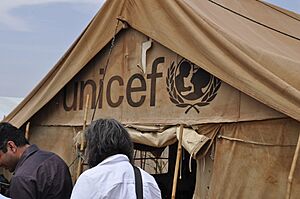
UNICEF works with country offices to carry out its mission. These offices create special programs with the local governments. These programs aim to protect the rights of children and women. Regional offices guide this work and offer technical help. The main management of UNICEF happens at its headquarters in New York City.
A board of 36 government representatives guides and watches over all of UNICEF's work. This board sets policies and approves programs. It also decides on how money will be spent. A smaller group, called the bureau, helps coordinate the board's work. This bureau includes a president and four vice-presidents. These five leaders are chosen each year from the board members.
The secretary of the executive board helps the board and UNICEF staff work well together. This office also arranges visits for board members to see UNICEF's work in different countries.
UNICEF Regional Offices
UNICEF has regional offices in several countries. These offices help support the work in their areas.
- The Americas and Caribbean Regional Office, Panama City, Panama
- Europe and Central Asia Regional Office, Geneva, Switzerland
- East Asia and the Pacific Regional Office, Bangkok, Thailand
- Eastern and Southern Africa Regional Office, Nairobi, Kenya
- Middle East and North Africa Regional Office, Amman, Jordan
- South Asia, Kathmandu, Nepal
- West and Central Africa Regional Office, Senegal
UNICEF National Committees
There are 34 national committees for UNICEF. Each one is an independent local group. Their main job is to raise money from private sources. This is important because UNICEF relies completely on donations. These national committees bring in about one-third of UNICEF's yearly income. This includes money from companies, other groups, and about six million individual donors worldwide.
Promoting UNICEF and Raising Money
In the United States, Nepal, and some other countries, UNICEF is known for its "Trick-Or-Treat for UNICEF" program. In this program, children collect money for UNICEF while trick-or-treating on Halloween. This program ended in Canada in 2006.
UNICEF works in 191 countries and areas. However, it is not involved in nine others. These include Bahamas, Brunei, Cyprus, Latvia, Liechtenstein, Malta, Mauritius, Monaco, Singapore, and Taiwan.
Many people in wealthier countries first learn about UNICEF through its national committees. These groups are mainly responsible for fundraising. They also sell UNICEF greeting cards and products. They create partnerships and speak up for children's rights. The US Fund for UNICEF was the first national committee, started in 1946.
In 2009, a British store called Tesco used "Change for Good" in its ads. This phrase is a trademark of UNICEF for charity use. UNICEF said this was the first time a company tried to use one of their campaigns for profit. They asked the public to think carefully about who they support when buying things. The "Change for Good" program is also supported by the Australian airline Qantas. Passengers donate coins in envelopes, and this has raised over $36 million since 1991.
Helping with Aid Transparency
UNICEF shares information about its aid work regularly. It uses a system called the International Aid Transparency Initiative (IATI). The organization has been checked for its transparency since 2012. In 2024, it received a "very good" score on the Aid Transparency Index.
Sports and Other Sponsorships
In 2003, UNICEF sponsored the Italian football club Piacenza Calcio 1919. This sponsorship lasted until 2008.
On September 7, 2006, UNICEF and the Spanish football club FC Barcelona made an agreement. The club agreed to donate €1.5 million each year to UNICEF for five years. As part of this deal, FC Barcelona wore the UNICEF logo on the front of their uniforms. This was the first time a football club sponsored an organization instead of being sponsored by one. It was also the first time FC Barcelona had another organization's name on their uniform. In 2016, the team signed a new four-year deal. They promised UNICEF £1.58 million per year and free advertising. Since 2022, Barcelona has partnered with Spotify. They now have the UNHCR logo on the back of their jerseys.
In January 2007, UNICEF partnered with Canada's national tent pegging team. The team was renamed "UNICEF Team Canada." Its riders wear UNICEF's logo in competitions. Team members also promote and raise money for UNICEF's fight against childhood HIV-AIDS.
The Swedish club Hammarby IF and the Danish club Brøndby IF also partnered with UNICEF. They raised money and displayed the UNICEF name on their sportswear. In 2007, NASCAR driver Jacques Villeneuve sometimes put the UNICEF logo on his #27 truck.
Australian A-League club Sydney FC also announced a partnership with UNICEF. They raise money for children in the Asia-Pacific region. They also displayed the UNICEF logo for the rest of the 2011-12 A-League season.
In Botswana, UNICEF helped fund new HIV/AIDS education for schoolchildren. This was done with the nonprofit group TeachAids.
UNICEF also partnered with the Scottish club Rangers F.C.. They pledged to raise £300,000 by 2011.
In 2010, UNICEF partnered with Phi Iota Alpha. This was the first time UNICEF worked with a Greek letter organization. In 2011, Phi Iota Alpha raised over $20,000 for UNICEF campaigns.
In 2013, UNICEF made a deal with Greek football champions Olympiacos F.C.. They agreed to show the organization's logo on the front of their shirts.
UNICEF Kid Power
UNICEF Kid Power started in 2015. It is a part of UNICEF that helps kids get involved in helping other children in need. UNICEF Kid Power created the first "Wearable for Good." This is called Kid Power Bands. It's a fitness tracker bracelet for kids that connects to a smartphone app. The app lets users complete missions. These missions count steps and give points. The points then unlock money from partners. UNICEF uses this money to send special food packets to children who are severely malnourished around the world.
Trick-or-Treat UNICEF Box
Since 1950, the Trick-or-Treat UNICEF box has been a tradition in North America. It started when children in Philadelphia, Pennsylvania, donated $17 they got on Halloween to help war victims. These small orange boxes are given to children before October 31. As of 2012, the campaign has collected about C$91 million in Canada and over US$167 million in the U.S.
Cartoons for Children's Rights
Cartoons for Children's Rights is a collection of animated short films. These films are based on UNICEF's Convention on the Rights of the Child. In 1994, UNICEF encouraged animation studios to create these short spots. They showed the international rights that children have.
Working with Companies
UNICEF works with companies worldwide to raise money. This money supports its Education and Literacy Programs. It partners with both large international companies and smaller businesses.
Since 2004, Montblanc has supported UNICEF. They work together to help children around the world get better access to education.
In June 2013, Merck & Co. partnered with UNICEF. They aimed to reduce deaths of mothers and the spread of HIV and tuberculosis in South Africa. Merck's "Merck for Mothers" program gives US$500 million globally. This money goes to programs that improve health for expectant mothers and their children.
In May 2010, Crucell N.V. announced a US$110 million award from UNICEF. This was to supply its pentavalent vaccine, Quinvaxem, to developing countries.
Companies Being Responsible
UNICEF works directly with companies to help them improve their business practices. This ensures companies respect children's rights. This includes how they act in the marketplace, workplace, and community. In 2012, UNICEF helped create the Children's Rights and Business Principles. These guidelines now form the basis of UNICEF's advice to companies. UNICEF helps companies improve their social responsibility. They guide them to find issues like child labour in their supply chains. Then, they help put actions in place to fix these problems.
UNICEF quickly responds to growing needs in the State of Palestine. This has helped over 32,000 people. In 2023, UNICEF needed US$23.8 million for important services there. They received 38 percent of that amount.
Girl Star Project
The Girl Star project is a series of films. It tells stories of girls from very poor communities in India. These girls overcame challenges through education. They became successful and independent. These young women are now role models in their communities. They inspire younger girls to go to school. They have chosen jobs like teaching, nursing, and even archery or bee-keeping.
Kids United Music Group
Kids United is a French music group. It started with six children and now has five. They were born between 2000 and 2009. The group was created to support UNICEF campaigns. Two French singers, Hélène Ségara and Corneille, sponsor them. Their first album, Un monde meilleur (A Better World), came out in 2015. It became very popular in France. The group has released several successful albums and is still active.
U-Report System
U-Report is a free text message tool. It helps communities share information and get real-time updates. It is designed to help communities develop and make positive changes. Text message polls and alerts are sent to U-reporters. Information is collected from their responses. Results and ideas are then shared back with the community. Topics include health, education, water, and youth unemployment. This system is now used in 68 countries and reaches over 11 million people.
Rugby League World Cup 2021 Partnership
On June 19, 2019, the 2021 Rugby League World Cup in England announced a partnership. UNICEF became the official charity for the tournament. This partnership aims to use the power of sport. It will raise awareness and money for UNICEF's work. This work protects children in danger around the world.
The Chief Executive of the 2021 Rugby League World Cup said there would be a special "UNICEF" game. This game would happen during the Men's World Cup.
Celebrity Ambassadors
UNICEF Ambassadors are famous people from entertainment and sports. They help raise awareness about children's needs. They use their talent and fame to raise money, speak up, and teach people about UNICEF's work.
UNICEF Facilities
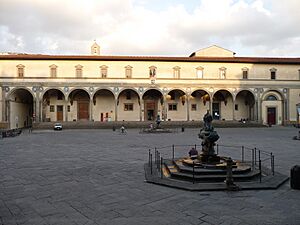
The UNICEF research centre at the Ospedale degli Innocenti in Florence
|
UNICEF World Warehouse
The old UNICEF World Warehouse is a large building in Denmark. It stores goods for UNICEF. It also stores emergency goods for other groups like United Nations High Commissioner for Refugees (UNHCR). Until 2012, the warehouse was 25,000 square meters. It was located in Copenhagen. Now, it has moved to a new, larger building called UN City. This new building brings all UN activities in Copenhagen together. The warehouse is part of UNICEF's Supply Division. This division also manages important centers in Dubai, Douala, and Colón.
The warehouse holds many different items. These include food supplements, water purification tablets, and vitamin supplements. It also stores the "School in a box." This box contains basic school supplies for one teacher and 40 students.
UNICEF Innocenti Research Centre
The UNICEF Innocenti Research Centre started in 1988. It is located in a historic building in Florence, Italy.
This center was created to make UNICEF's research stronger. It also helps UNICEF speak up for children worldwide. It is the research part of UNICEF. Its main goals are to improve understanding of children's rights. It also promotes economic policies that help children. The center helps make sure the United Nations Convention on the Rights of the Child is fully followed in 190 countries.
UNICEF Innocenti plans its research with other parts of UNICEF and outside experts. The center focuses on new questions and important issues related to children's rights. It works with UNICEF's field experience and international experts. This helps strengthen its work with other research groups and policymakers.
Challenges and Concerns
Like any large organization, UNICEF sometimes faces challenges. These can include managing funds effectively. There have been times when money was not used correctly. UNICEF works to improve its systems to prevent such issues.
UNICEF has a policy about orphanages. It prefers them to be only temporary places for children. This is for when there are no other options. UNICEF believes children should stay with their families or communities if possible. Because of this, UNICEF has been careful about international adoptions. They prefer children to be cared for in their home countries.
Some people have raised concerns about how quickly child deaths have decreased in certain areas. For example, in Sub-Saharan Africa, the child mortality rate was still high in 2013. UNICEF continues to work hard to reduce these numbers. They focus on preventing diseases and improving nutrition.
See also
 In Spanish: Unicef para niños
In Spanish: Unicef para niños
- Afghan New Beginnings Programme
- Alliance for Healthy Cities
- Awaaz do – India
- Facts for Life
- Integrated Management of Childhood Illness
- Ludwik Rajchman, founder of UNICEF and its first Chairman
- James P. Grant, who was the third executive director of UNICEF
- Multiple Indicator Cluster Survey, statistical monitoring program of UNICEF
- Music for UNICEF Concert
- Odisha State Child Protection Society
- Unite for Children, Unite Against AIDS
- Voices of Youth
- RapidSMS (co-developed by UNICEF)
- Children in emergencies and conflicts
- Refugee children
- Child marriage
- United Nations
Links
- Official UNICEF website: https://www.unicef.org/
- UNICEF 2018 Annual Report, downloadable in several languages
- United Nations Rule of Law: The United Nations Children's Fund, on the rule of law work conducted by the United Nations Children Fund.
- (EN) UNICEF, Office of Research-Innocenti, Florence
- [[Category:Nobel Prize in {{{1}}} winners]] including the Nobel Lecture, 11 December 1965, UNICEF: Achievement and Challenge
| Awards and achievements | ||
|---|---|---|
| Preceded by Martin Luther King Jr. |
Nobel Peace Prize Laureate 1965 |
Succeeded by René Cassin 1968 |
| Preceded by Turkish Red Crescent 1995 |
Atatürk International Peace Prize 1996 |
Succeeded by Stabilisation Force in Bosnia and Herzegovina 1997 |


